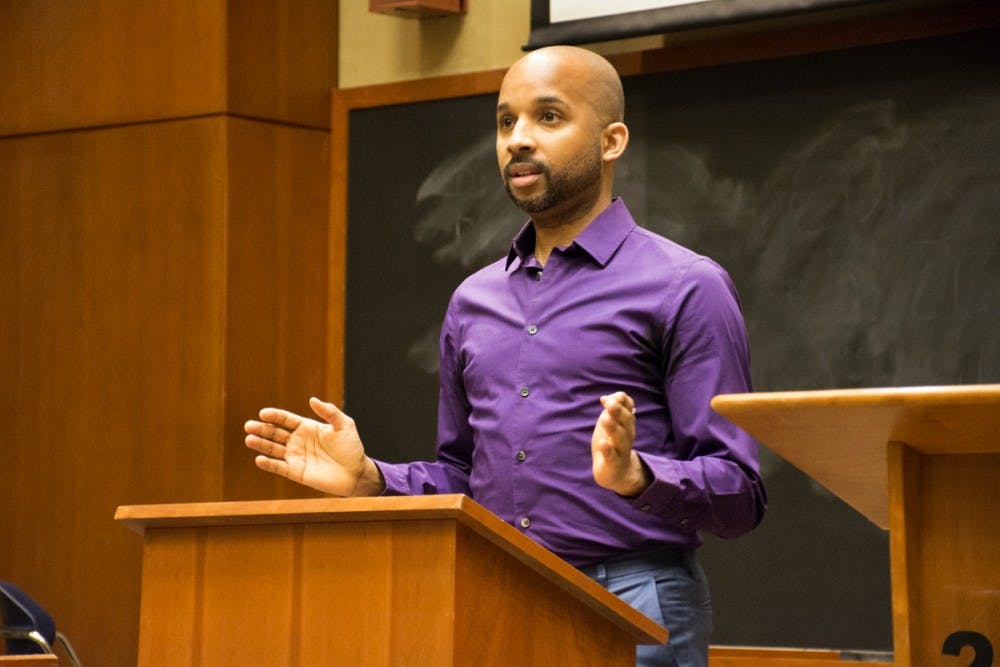Antuan Raimone — an actor in the Broadway shows “Hamilton” and “In The Heights” — spoke about his experiences as a survivor of sexual assault at an event hosted by the Maxine Platzer Lynn Women’s Center’s Gender Violence and Social Change program in Nau Hall Monday evening with an audience of about 15 people.
In his presentation, “Love is Stronger than Fear,” Raimone touched on the sexual abuse he experienced as a child, his recovery process and the effect the abuse had on his relationships. He also spoke about the difficulties, fears and experiences he faced — and faces today — as a gay black male.
“[As a high schooler], I had no real idea what it meant to be gay,” Raimone said. “I knew it only as an insult, a warning, something to be feared and hated … I didn’t see the act of sex between men as something that could include love. I believed for at least 15 years of my adult life that if any man showed interest in me, it was because they wanted to have control of my body — and that mindset followed me to college.”
Raimone said he feared living up to stereotypes of black men, gay men and black gay men. Although he engaged in sexual relationships with men, he did not believe love could exist between two men until he fell in love, but after admitting love for his partner, they ended the relationship.
Raimone said he struggled to be vulnerable with romantic partners and eventually sought help from the Crime Victims Treatment Center in New York City, where he reckoned with his trauma and learned to love himself.
“I had always thought that my inaction was a sign of weakness, not strength or survival,” Raimone said. “I didn’t know it at the time, but I was on the path of finding the peace I was desperately looking for.”
In 2014, Raimone experienced “an avalanche of loss.” His father died, his two-year long relationship ended and he moved out of the apartment in which he had been living for seven years. He sought help from the CVTC again.
“I felt as if I was standing in every natural disaster I could imagine,” Raimone said. “I felt that I was losing myself — losing my ability to be vulnerable, and it terrified me.”
Raimone worked with his therapist over months, and eventually felt comfortable to be vulnerable to share his experiences with his friends.
“They surrounded me with all of the support and love that I needed when I needed it most,” Raimone said. “That moment would be the break in the storm that I was looking towards.”
Before closing, Raimone answered several questions from the audience.
Claire Kaplan — director of the Gender Violence and Social Change program at the Women’s Center — said she met Raimone when he spoke at a conference in summer 2018.
“I went up to him afterwards and said, ‘I’d love to bring you to U.Va.’” Kaplan said. “Most people say, ‘email me,’ but he emailed me. And we chatted all summer. I thought, ‘I think the students would really enjoy hearing from him.’”
Kaplan said the Women’s Center has been working on making their programs and services more accessible to male survivors, and the event was a part of this outreach effort. Kaplan said she hoped the event provided insight to audience members about the experiences of male survivors.
“We will continue to offer opportunities for men,’ Kaplan said. “They can get counseling services at the Women's Center with our trauma counselors. We have some art projects, therapeutic art projects for all survivors, and men are included in that.”
Women’s Center Director Abby Palko said each person who attended the event will have gotten something different out of it.
“For some people it might be learning about an experience that’s different from their own, for others it might be hearing from someone who shares some of their identity talking about an experience that they may or may not have had,” Palko said.
The Women’s Center, established in 1989, offers services and opportunities to members of the U.Va. community including internships, mentorship programs and public talks, in a mission to ensure women and girl’s safety, develop leadership, create social change and work for gender justice on and off Grounds.
The Women’s Center also provides counseling services. According to Palko, the Center sees a little more than 100 regular clients per year, roughly 95 percent being female. About 20 percent, Palko said, cite experiencing sexual assault as the reason for visiting, and another 15 percent cite experiencing another form of interpersonal violence.
In an interview with The Cavalier Daily, Raimone said that if sharing his story provided support to people, he was happy to do it.
“We are all capable of living a life of love,” Raimone said. “I think it’s easy to get pulled into the stress and fear of life that comes from anything … I just want people to want a happiness for themselves.”





